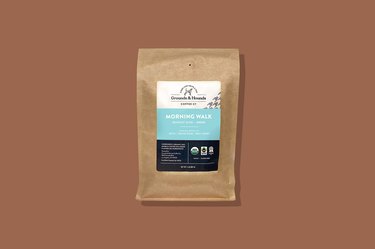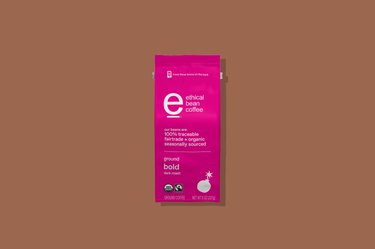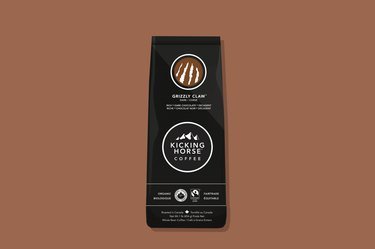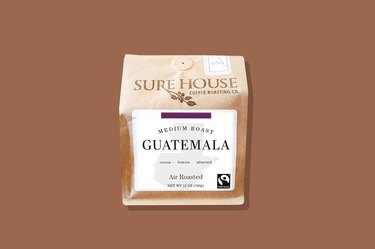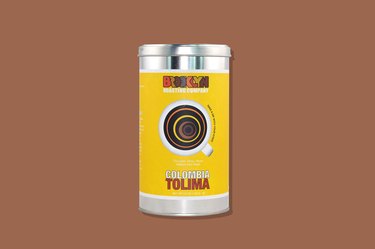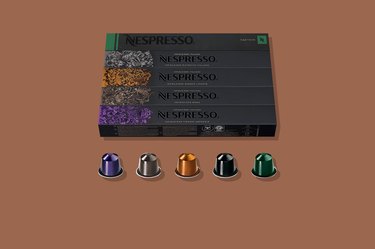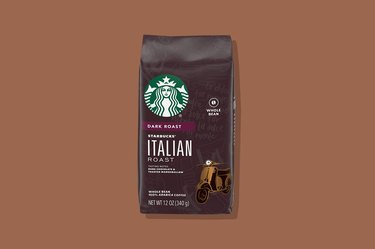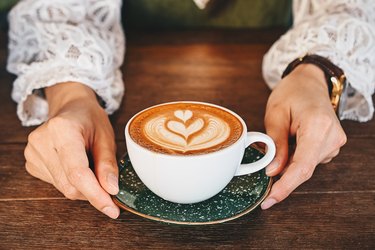
If you're like most people, you probably start your day with a hot cup of joe — be it made at home with a bag of beans or picked up from a local cafe. What's less likely is that you know where the coffee beans really came from. Here's why you should.
More than 87 percent of the world's coffee comes from Latin America, including Colombia, Honduras, Peru and the Caribbean, with the average farmer making just $2 per day, according to Fairtrade America, a non-profit organization that works to ensure that coffee farmers and workers are justly paid for their labor and goods.
Video of the Day
Video of the Day
The COVID-19 Pandemic's Effect on Coffee Farmers
Oftentimes, farmers depend on a single cash crop as their sole source of income, which has become more vulnerable to the recent effects of climate change and the COVID-19 pandemic, Isabella Pacheco, Fairtrade America's beverage specialist and development manager of sustainability and partnerships, tells LIVESTRONG.com.
"The pandemic has really brought up how sensitive and fragile our coffee supply chains are," Pacheco says. "We don't realize that most of the time, they are fragile because we are looking for it to be done in the cheapest way possible instead of the most sustainable way and for the good of the workers."
Pacheco says that coffee farmers already faced mounting challenges before the pandemic. "The market price for coffee has been way below the cost of production for years now," Pacheco says. In 2019, the market price for coffee per pound was under a dollar, and today, the price hovers just above $1.20 per pound, according to Markets Insider.
At such a low market price, the pandemic only made it more difficult for farmers to get their goods to coffee shops and sellers. "For example, we have producer networks in Honduras, and lockdowns were happening during the time of exports, so the coffee had already been picked and dried. But some countries were closing their ports, and we didn't have information on how to handle the goods," Pacheco says.
"We don't realize that most of the time, the [coffee supply chain is] fragile because we are looking for it to be done in the cheapest way possible instead of the most sustainable way and for the good of the workers."
Moreover, the pandemic left many questions looming: Were farmers going to get paid? Are contracts going to default? And because crop picking depends largely on migratory workers, how were they going to travel and do so safely?
When countries across the world closed down their ports in March 2020, many of the essentials that coffee farmers rely on were left at a dead-end. "Fertilizers, hand sanitizers, masks and other important supplies for farming were at a standstill, and there weren't regulations put in place on how things were going to export again," Pacheco says.
"Let's just say, it made an already challenging world much, much more challenging, and more expensive. Imagine getting paid below cost for four years in a row, and then on top of that, now you have all of these expenses to meet safety requirements."
Further burdensome was the number of hurricanes in the past year that ravaged parts of Central America. Hurricanes Eta and Iota, for example, left farming communities in Panama, Honduras, Costa Rica and El Salvador decimated and still in recovery mode, Pacheco says.
Why You Should Buy Fairtrade Coffee
Fairtrade certification has put standards in place that have mitigated some of the devastations from the pandemic and climate change. Just like with chocolate, Fairtrade sets a minimum and premium price on coffee, which helps protects farmers from being poorly compensated.
The minimum price, which is currently $1.40 per pound — roughly 40 percent more than the current market price — is what coffee companies pay to cover the costs of labor, fertilizers, seeds and exporting. But coffee growers also get paid the premium price — an additional $0.20 per pound — which helps fund community projects, like building schools, playgrounds and hospitals.
"We leave it up to the co-ops to empower themselves and say how they are going to improve their production and community," Pacheco says. "It's important to understand that Fairtrade certification covers three pillars of sustainability: economic, social and environmental."
So when you purchase Fairtrade coffee, you're not only supporting the farmers who grow the crops, but you're investing in systems that make their way of living more resilient.
There's an African proverb that goes, 'If you think you're too small to make a difference, you haven't spent a night with a mosquito.' We tend to think that our decisions won't really affect others, but it all adds up. We need to ask ourselves, 'How does my purchase affect the living conditions of others, and how does it extend to the planet?'
Fairtrade also promotes equality and safety in coffee farming. "Every Fairtrade producer group that gets certified and goes through our standards commit to no discriminations of hiring on the basis of gender and marital status. There is zero tolerance for sexual harassment and abuse," Pacheco says.
There are now Fairtrade co-ops of coffee growers in Guatemala that are run entirely by women and have titles to the land they work on, Pacheco says. Fairtrade educates women to better manage their income and use certain technology and practices that will help them be more successful in their work.
"A lot of the time, these coffee producers get one check a year, so it's very important for them to know and understand planning out expenses and giving them these tools," Pacheco says.
Child labor is comparatively less common in coffee than it is in chocolate, Pacheco says. "Every place where there is poverty there is a high risk for child labor, but our standards have no tolerance for child labor and work to make sure that nobody under 15 years old should be employed and that anyone below 18 years old shouldn't work if it hinders their education and development."
And your buying decisions really can make a social and economic impact.
"There's an African proverb that goes, 'If you think you're too small to make a difference, you haven't spent a night with a mosquito.' We tend to think that our decisions won't really affect others, but it all adds up. We need to ask ourselves, 'How does my purchase affect the living conditions of others, and how does it extend to the planet?'"
Exactly What to Look for in a Fairtrade Coffee Label
Be Extra Critical of 'Fair Trade' Claims
Confusing as it is, you should know that there's a difference between "Fairtrade" and "fair trade."
Unlike Fairtrade, the fair trade label isn't regulated so any food manufacturer can slap this on their product without third-party verification. On the other hand, products with the official Fairtrade seal have been vetted and have gone through rigorous processes to meet certain standards.
You can find Fairtrade coffee brands by looking for the official Fairtrade seal on products, Pacheco says. Be sure you're looking for "Fairtrade" and not "fair trade."
Opt for Organic
Look for "organically grown" and "non-GMO" beans to support small farms and reduce your consumption of pesticides. There are some health benefits to purchasing Fairtrade coffee, too.
"Conventional, big coffee farms are known to use toxic pesticides that may be harmful to human health, and the environmental health of our planet. So there is a hope that by supporting small farms that use regenerative farming methods and grow their crops organically without using herbicides, we can benefit on a large scale," Ella Davar, RD, a registered dietitian integrative nutritionist and certified health counselor says.
7 Fairtrade Coffee Brands to Buy
To help you make smarter shopping choices, we rounded up some of our favorite Fairtrade coffee brands.
1. Grounds & Hounds Coffee Co.
With a mission to help homeless dogs find a family and support Fairtrade farmers in Peru, Colombia, Ethiopia and Guatemala, among other countries, you can't go wrong with Grounds and Hounds Coffee Co. About 20 percent of their profits go toward animal rescue programs across the country.
Enjoy single-origin roasts to light, medium, dark, decaf and cold brew blends. Some of the most popular roasts are the Morning Walk Breakfast Blend, brimming with cocoa, sweet cherry, toffee and toasted pecan flavors, and the Two Tails Espresso, a full-bodied dark roast with toasted vanilla, honeycomb, milk chocolate and marshmallow notes.
We can't imagine a better way to enjoy breakfast!
Buy it: Amazon.com; Price: $32.99 per 2-pound pack
2. Ethical Bean
The founders of Ethical Bean were inspired to start a business of selling ethically sourced coffee beans after spending nearly a year in Guatemala and learning about the farmers and workers growing the beans.
Ethical Bean uses only 100 percent Fairtrade-certified and organic beans, and their delicious roasts accommodate a range of coffee connoisseurs. Available in ground and whole beans, Ethical Bean offers medium to dark roasts, as well as French roast, sweet espresso and decaf. If you're curious about the coffee co-ops they work with, every package comes with a unique QR code, which allows you to trace the co-op.
Buy it: Amazon.com; Price: $8.99 per 8-ounce bag
3. Kicking Horse
This Canadian-based company is 100-percent Fairtrade and has been voted as Canada's best-tasting coffee. Why the name "Kicking Horse?" Legend has it that a Rocky Mountain explorer was kicked in the head by a horse and nearly died, but a cup of coffee helped bring him back to life, according to the company's website.
Kicking Horse's coffees are layered with flavor. For example, their Hola coffee has berry and brown sugar notes with a creamy honey body. If you're more of a chocolate lover, the Grizzly Claw satisfies your craving with hints of dark cocoa, brown sugar and roasted hazelnut.
In addition to selling ground and whole beans, Kicking Horse launched a cold brew in 2017, which has the robust flavor of coffee you love while also being low-acid and unsweetened.
Buy it: Amazon.com; Price: $10.87 per 10-ounce bag
4. Sure House Coffee Roasting Co.
You can be sure that you're getting quality, Fairtrade lattes when you shop at this Wooster, Ohio-based business. As a small roaster, Sure House focuses on single-origin beans from different parts of the world, including Ethiopia, Guatemala, Rwanda, Peru, Sumatra and Mexico.
For now, you can stick to buying these beans online. If you're able to travel post-pandemic, it's worth visiting one of their two cafes in Ohio, where you can pick up flat whites, macchiatos, dirty chai lattes and, yes, even a dirty golden milk latte. Plus, they have a delicious assortment of baked goods and fixings to jazz up your joe, like lavender, chili pepper and cardamom simple syrups.
Buy it: SureHouseCoffee.com; Price: $12.50 per 12-ounce bag
5. Brooklyn Roasting Company
Founded by Jim Munson in 2009, Brooklyn Roasting Company is dedicated to sourcing Fairtrade coffee and has multiple shops all over New York City. Their range of roasts is a reflection of the melting pot that is the borough of Brooklyn itself.
Their Colombia Tolima, for example, is sourced from the Tolima region in Colombia and is a medium roast with sweet, citrus and toasted pecan notes. With any roast, can choose from different grinds, including coarse, espresso, medium and whole beans.
Coffee enthusiasts will also appreciate that they have a bevy of brewing essentials, like grinders, homebrew kits and even coffee peanut butter.
Buy it: Amazon.com; Price: $15 per 12-ounce tin
6. Nespresso
You might know Nespresso for its premium coffee pods and fancy machines and frothers, but this international coffee company is also known for its sustainable and Fairtrade practices.
In 2014, Nespresso partnered with Fairtrade International, the Aguadas Coffee Growers' Co-op and the Colombian Ministry of Labour to create a pilot pension program for retired coffee farmers in the Colombian town of Aguadas.
Concerned about the environmental consequences of using coffee pods? Nespresso has a recycling program, where you can purchase recycling bags for storing used coffee capsules and drop them into a recycling bin. In New York City, you can place coffee capsules directly into a recycling bin — no bag needed.
Buy it: Amazon.com; Price: $35 per pack of 50 espresso pods
7. Starbucks
Yup, Starbucks, arguably the most recognized chain of coffee shops in the world, has been working with Fairtrade farmers since 2000. In addition to meeting Fairtrade standards, Starbucks funds more than $14 million in farmer loans, so you can feel a little better about ordering that Frappuccino twice in one week.
But no need to stop by a shop every morning. Wake up to Starbucks' freshly brewed coffee at home with its assortment of blonde, medium and dark roasts and Verismo pods.
Buy it: Amazon.com; Price: $39.54 per 6 bags
Tip
As divine as coffee is, you'll want to be mindful of how much you're drinking, especially when it comes to your caffeine intake.
"Coffee increases the activity of the central nervous system, stimulating hormones like adrenaline, and neurotransmitters that impact our energy. The problem is that our body adapts to the delicious taste and flavor of roasted coffee beans," Davar explains.
The Food and Drug Administration advises enjoying no more than 400 milligrams of caffeine — or four to five cups — of coffee daily.
- Fairtrade America: "Fairtrade Fights Poverty"
- Markets Insider: "Coffee"
- Reuters: "Storms That Slammed Central America in 2020 Just a Preview, Climate Change Experts Say"
- Fairtrade International: "Fairtrade Minimum Price and Premium Information"
- Fairtrade America: "Fairtrade Versus Fair Trade"
- Fairtrade America: "Behind the Fairtrade Mark"
- Food and Drug Administration: "Spilling the Beans: How Much Caffeine Is Too Much?"
